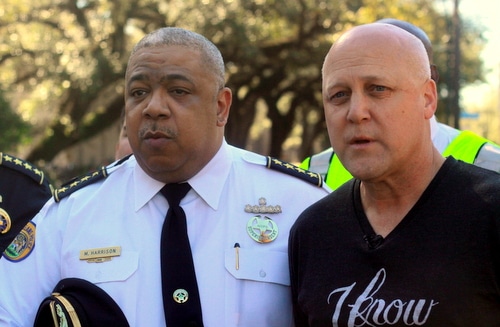
NOPD Chief Michael Harrison and former Mayor Mitch Landrieu speak to the media during Mardi Gras celebrations in 2017. (Robert Morris, UptownMessenger.com)
Superintendent Michael Harrison is leaving the New Orleans Police Department after accepting a job as police commissioner in the city of Baltimore, he announced Tuesday morning.
Harrison has led the NOPD since former Mayor Mitch Landrieu named his as the successor to former Chief Ronal Serpas in 2014. Unlike Serpas — whose leadership coincided with the implementation of widespread and sometimes-unpopular reforms from the federal consent decree — Harrison remained fairly well-liked by officers and uncontroversial in public.
Likewise, Harrison’s position leading the NOPD never became an issue during the most recent mayoral campaign — again, unlike during Landrieu’s election, which included a high-profile search leading to Serpas’ appointment. In fact, former City Councilwoman Susan Guidry, chair of the council’s criminal-justice committee, urged incoming Mayor LaToya Cantrell to keep Harrison in office, noting that the NOPD was far more stable under his leadership than that of other city departments that needed more immediate attention.
Harrison praised Cantrell on Tuesday morning in his statement announcing his move to Baltimore.
“Since my reappointment in May 2018, I have enjoyed the complete support of New Orleans Mayor LaToya Cantrell,” Harrison said. “For that, I wish to express my profound gratitude. From the time she was sworn in, she has provided us the necessary resources and support critical to carrying out our mission of reducing violent crime and implementing 21st century policing reforms.”
In 2018, the city of New Orleans recorded 146 homicides — the lowest figure since 1971, although still around third-highest in the country on a per-capita basis, according to The New Orleans Advocate. Baltimore, however, is one of the few cities in the country likely to have a per-capita murder rate even higher than New Orleans’.
Baltimore has been pursuing Harrison “for quite some time” because of his work on police reform and violent-crime reduction in New Orleans, according to his office. After Baltimore’s previous top candidate withdrew from consideration, Baltimore asked Harrison yet another time to take the job, and he accepted, he said.
“To the citizens of New Orleans I would like to say, serving as your police chief for the past four years has been the highest honor and privilege of my 28-year career with the New Orleans Police Department,” Harrison said. “This city and its people will forever hold a special place in my heart.”
Both City Council members Helena Moreno and Jason Williams praised Harrison’s service in New Orleans after his announcement Tuesday morning.
“I’m proud of the work Chief accomplished as NOPD’s leader: from his unwavering commitment to constitutional policing and deep community engagement to his effectiveness at lowering violent crime, to his focus on building an impressive and diverse leadership team around him,” Moreno said. “I’ve come to know Mayor Pugh of Baltimore through our participation in Women’s leadership group and have learned about the challenges Baltimore faces in terms of violence and public safety. She has made a wise choice in hiring Chief Harrison. He’s the right man for the job. New Orleans’ loss is Baltimore’s gain.”
Williams promised that Harrison’s work on police reform will continue following his departure, and noted their own longstanding personal relationship in addition to his leadership.
“I have known Michael since he was a young officer with black hair and I was a young lawyer with hair,” Williams said. “He is a wonderful man and has ushered our city through an extremely precarious time. Consent decrees are typically met with disdain from top to bottom. Chief Harrison instead embraced it, leading the NOPD to become the national standard bearer of police reform and increasing public safety at the same time. Through unique programs such as Ethical Policing Is Courageous (EPIC) and a revolutionary training partnership with the Innocence Project of New Orleans, the Department has made exponential improvements under his leadership.”